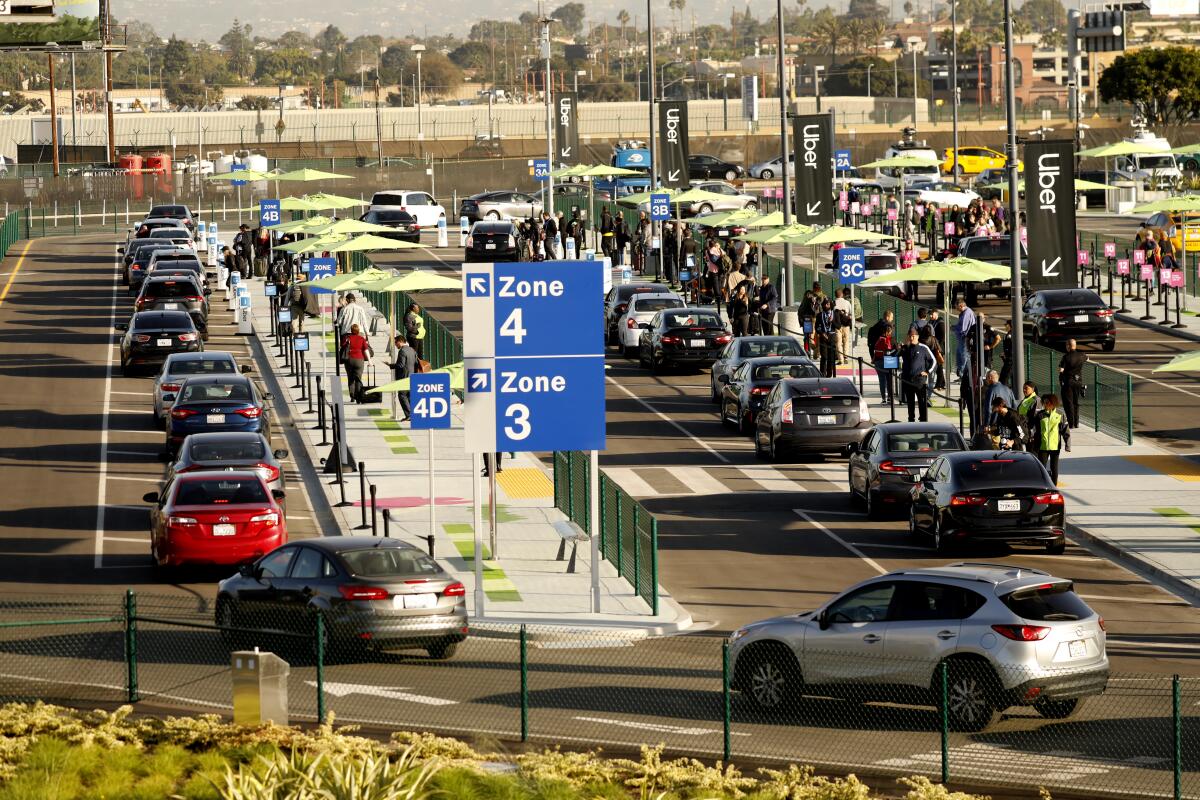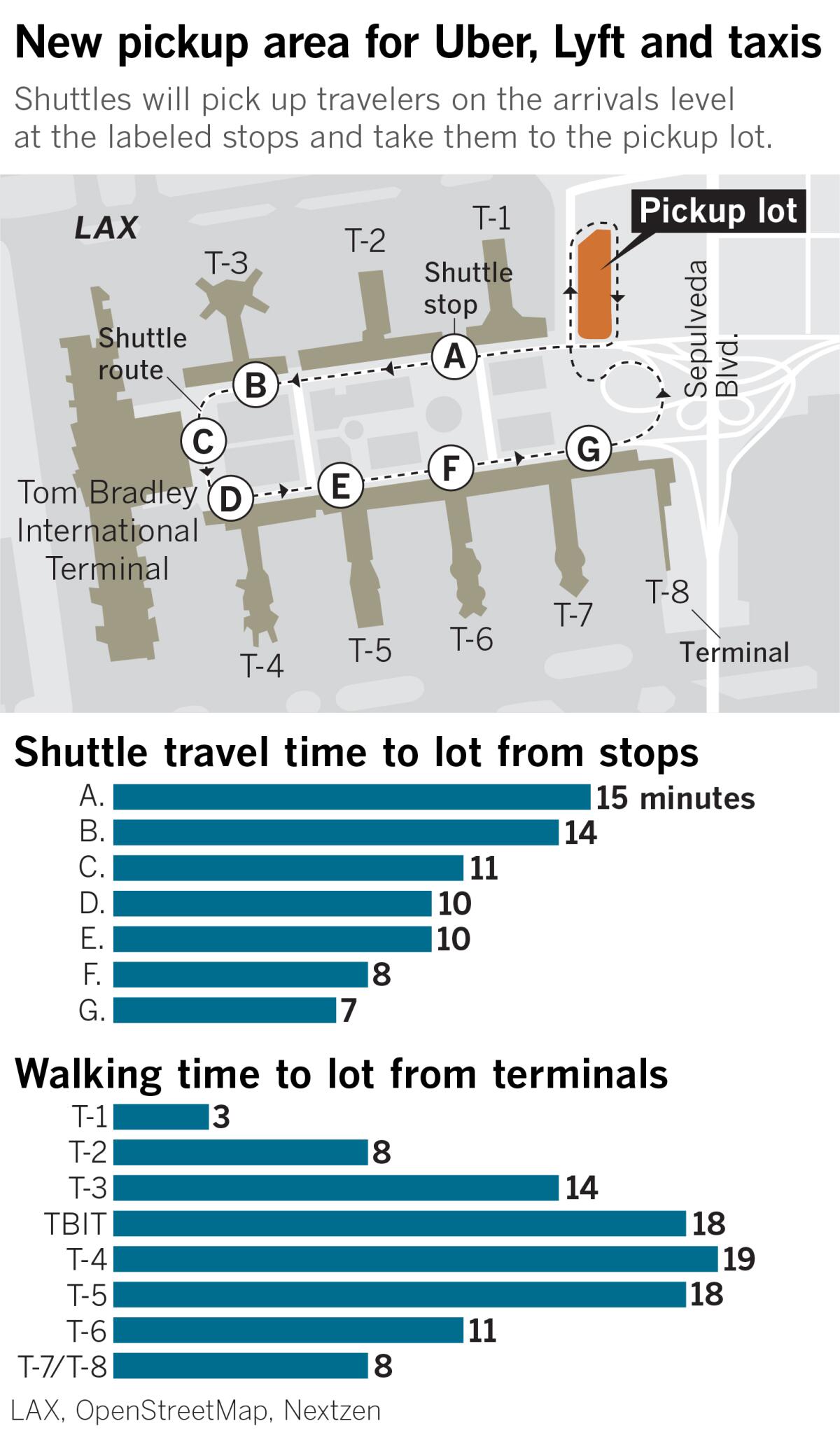Long lines and long waits for some on Day 1 of LAX’s new Uber, Lyft and taxi system

Mickey Swearingen stood outside Los Angeles International Airport on Tuesday morning, staring at his phone, then at a series of overhead signs, then back at his phone again.
When the 19-year-old got off a plane from Houston and opened the Uber app, a message popped up, telling him to meet his driver in the “LAX-it” area.
“Other than the fact that I don’t know what that is, or how to get there, it’s going really well,” said Swearingen, a content creator on TikTok, the popular video-sharing app, who came to Los Angeles to meet his online friends in real life.
In an attempt to tame the infamous traffic at the nation’s second-busiest airport, LAX officials on Tuesday took a major step: banning most Uber, Lyft and taxi pickups from the curbside. Drop-offs, which occur on the upper level, have not changed.
Even on a low-traffic day, the new pickup system had some growing pains. At points in the early afternoon, the wait time for Uber and Lyft rides swelled, with more than 100 people waiting in each line for their drivers in the pickup lot.
“When you make a bold change like this, you’ll be faced with a little bit of refining to get it right,” said Keith Wilschetz, deputy executive director at Los Angeles World Airports, the city agency that runs LAX.
Travelers spent an average of 10 minutes waiting for the shuttle, boarding and riding it to the pickup lot on Tuesday, airport officials said. It took an additional eight minutes for travelers to get in a taxi and pull away from the curb; for Uber and Lyft, that time was 18 minutes.
The biggest problems the airport faced on Tuesday can be addressed with relatively quick and easy fixes, Wilschetz said. That includes improving signage and smoothing out the queuing areas for drivers to improve the throughput of the LAX-it lot (which airport officials pronounce “LA-exit”).
The city has a few days to improve the system before the busiest travel day of the week, Sunday.
The part of the new system that drew the most dread — the shuttle buses to the pickup lot — drew few complaints. The buses ran frequently and quickly, aided by a new policy that restricts the lanes closest to baggage claim to airport buses.
The once-chaotic areas just outside baggage claim were eerily quiet, with no honking or idling cars. Travel time on the upstairs departures level, where Uber and Lyft drivers previously picked up passengers, improved by 50% compared with the same time last week, the airport said.
Shifting Uber, Lyft and taxis to a satellite lot immediately removed about 15% of the vehicles in the terminal, Wilschetz said. The other 85% of drivers, he said, were “enjoying themselves today.”

Those average figures didn’t stop an avalanche of complaints from individual riders who had more miserable experiences. Many had become accustomed to waiting for their rides by the curb, even though that process could often take a half hour or more as Uber and Lyft drivers inched through traffic.
Some riders, fed up with long waits for Uber and Lyft cars, gave up and took taxis instead. The cab line moved the fastest, aided by a low-tech system: a queue of cars, and a “first come, first served” policy.
But overall, ridership on taxis was far lower than on Uber or Lyft, worrying the drivers whose incomes depend on airport service.
More than 100 cab drivers rallied to protest the new system Tuesday morning, saying the relocation had hurt their business. Under LAX’s previous system, taxis were available at cab stands right outside the terminal area next to baggage claim, while Uber and Lyft pickups were on the upper level.
“Now customers see all the options in the same place, and they are choosing the cheapest ones,” said Shaikh Masud, who has been driving for Yellow Cab for five years, as he waited in the queue. “We don’t set our own prices. I’m very concerned.”
City Councilman Paul Koretz introduced a motion Tuesday asking airport officials to move cab pickups back to the curbside. Moving them to the satellite lot, he said, would be the “final nail in the coffin of the taxi industry.”
The pickup lot was swarming with employees from LAX, Uber and Lyft, wearing vivid jackets and branded hats, who tried to steer passengers to the right places. But many drivers and riders struggled to find one another in the vast parking lot.
“I’m done,” Lyft driver Luis Vazquez said angrily, after he waited more than an hour to pick up a customer. In that time, he said, he could usually complete two or three trips.
Two Uber drivers canceled on Erik Newlin, a businessman from Dallas, as he waited in the pickup area. He was on the phone trying to connect with a third driver, but that car canceled too.
“This has been a complete cluster,” Newlin said as he made a fourth attempt. “It cost me 25 minutes I didn’t have.”
The pickup lot has four separate lanes for car companies: two for Uber, one for Lyft and one for taxis. In a nearby plaza, picnic-style tables and other seating options are arranged next to two food trucks, designed to serve as a sort of “welcome to L.A.,” said Deborah Flint, the chief executive of LAX.
By early afternoon, dozens of people were waiting for Uber and Lyft cars, forming long lines down the sunny curbs in the parking lot. Some crammed together under green umbrellas.
A group of people with Uber stickers on their laptops were observing the chaos from the picnic tables. A man wearing Lyft’s hot-pink safety vest said into a walkie-talkie: “We’ve got a shortage of cars.”
Sabir Cham, 29, and Melissa Panganiban, 32, of Culver City, stood in a long line of Lyft customers in the hot afternoon sun. After the efficiency and order of Japan, where they had just taken a vacation, the lot seemed chaotic, they said.
“It says it’s four minutes away,” Cham said, “but it’s said that for way more than four minutes.”
The couple eventually waited for nearly half an hour.
Swearingen, the TikTok star from Houston, began messaging his driver in the Uber app as he rode the shuttle toward the pickup area. After he got settled in his Airbnb in MacArthur Park, he said, he and his friends were planning to go to a Halloween party with “about 100 influencers.”
“I hope this driver has a phone charger and an aux cord, because I’m ready to get lit,” he said, as he hopped into the waiting Honda.
As part of the Uber, Lyft and taxi changes, airport officials also converted the area closest to the terminal into a bus-only route and shifted friend-and-family pickups to the median island.
“I’m gone for a year and this happens,” said Valerie Carter, a longtime Los Angeles resident who recently moved to Tennessee, shaking her head as she waited for her ride on the median. “Now I’m over here, but we always used to be over there.”
The changes will remain in place until airport officials finish building an elevated airport train, scheduled to begin service in 2023. The people-mover will arrive every two minutes and will whisk passengers between the terminals, a car rental facility, a ground transportation hub and a Metro station.
More to Read
Sign up for Essential California
The most important California stories and recommendations in your inbox every morning.
You may occasionally receive promotional content from the Los Angeles Times.











